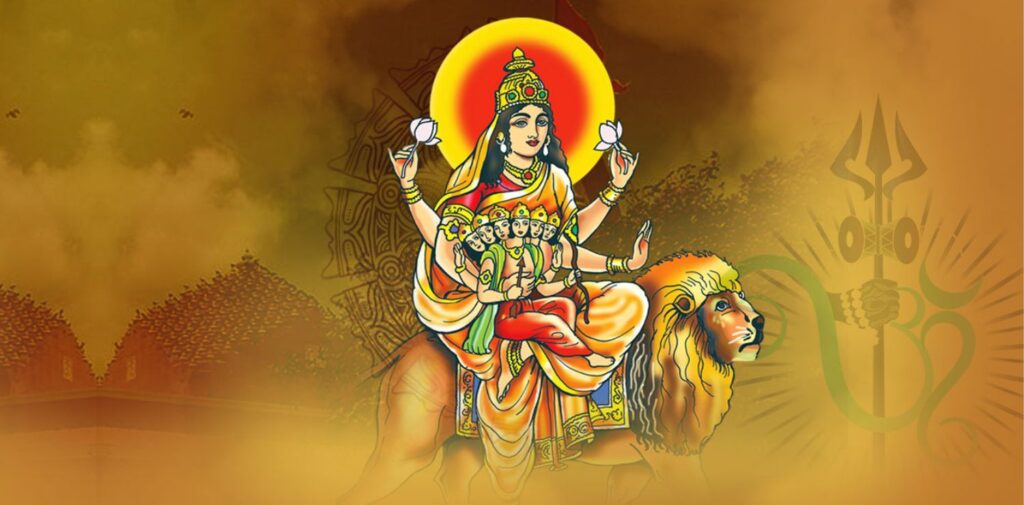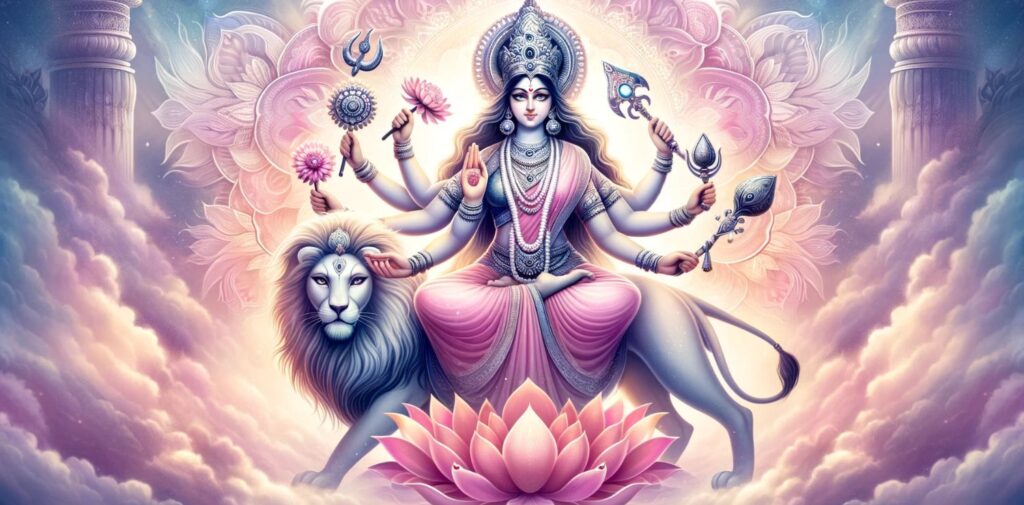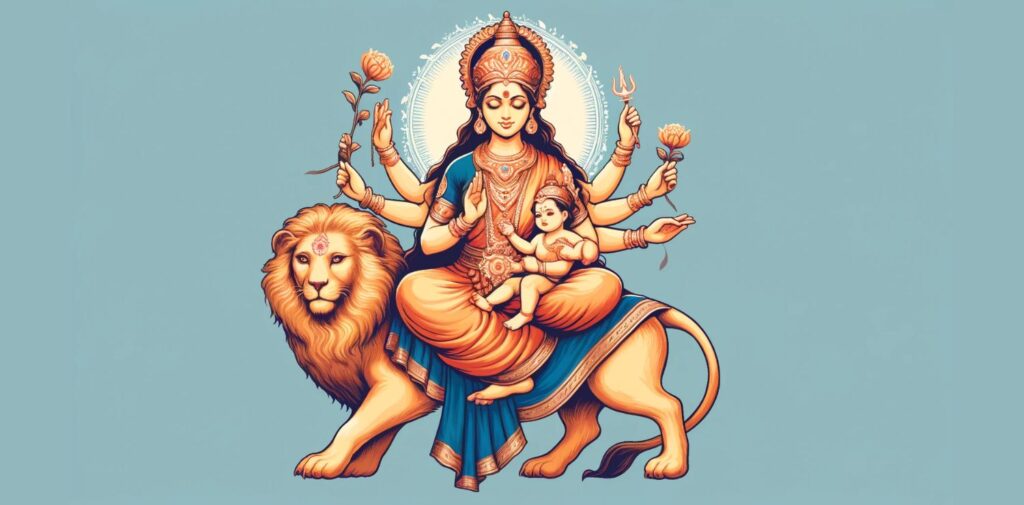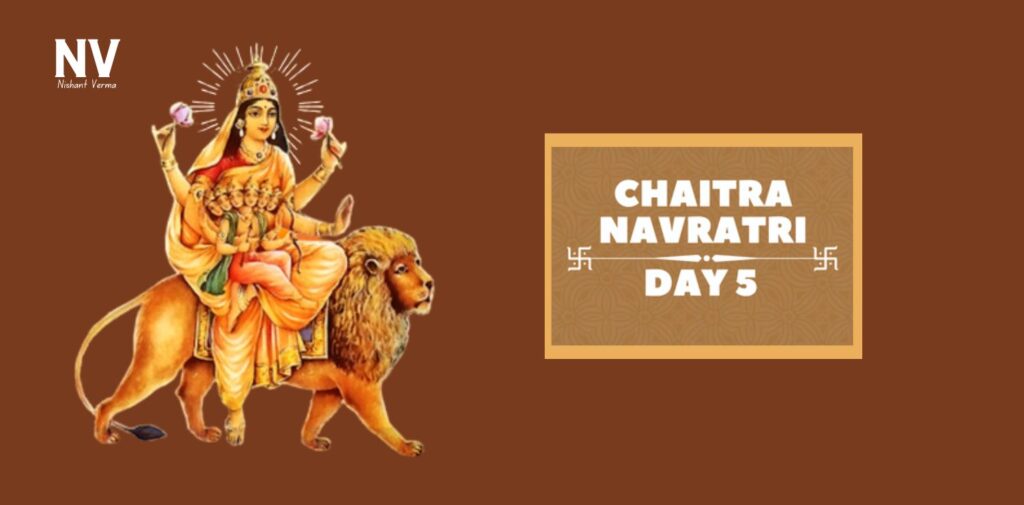Navratri is one of the most vibrant and significant festivals in Hindu culture, celebrated with great zeal and devotion all across India. It spans nine nights and ten days, dedicated to the worship of the nine different forms of Goddess Durga. Each day holds a special significance as devotees worship the unique aspects of the Divine Mother. Day 5 of Navratri is devoted to Goddess Skandamata, a manifestation that signifies peace, purity, and maternal love. In this article, we’ll explore the qualities, stories, and rituals associated with Goddess Skandamata, as well as the relevance of worshipping her on the fifth day of Navratri.
Who is Goddess Skandamata?
Goddess Skandamata is the fifth form of Navdurga and is revered as the mother of Lord Kartikeya, also known as Skanda. The name Skandamata is derived from two words: Skanda, which refers to her son Kartikeya, and Mata, which means mother. Hence, she is known as the mother of Lord Kartikeya, the commander of the celestial army and a symbol of valor and courage.

Skandamata is often depicted with four arms and a radiant face that exudes serenity and compassion. She holds her beloved son, Skanda, on her lap, showcasing her nurturing nature. In two of her hands, she carries lotus flowers, symbolizing purity and spiritual growth. One hand is raised in the posture of granting boons and blessings, while the fourth hand supports Lord Skanda. She is usually seated on a lotus, which is why she is also referred to as Padmasana.
The Legend of Skandamata
The story of Skandamata revolves around the birth of Lord Skanda and her role as a mother. According to Hindu mythology, when the gods were defeated by the demon Tarakasura, they sought the help of Lord Shiva and Goddess Parvati. It was foretold that only the son of Lord Shiva and Goddess Parvati would be able to defeat the mighty demon.
Goddess Parvati took on the form of Skandamata to give birth to Skanda, also known as Kartikeya. With her immense power and divine energy, Skandamata gave birth to Skanda, who eventually grew up to become a powerful warrior and led the celestial armies to victory against Tarakasura. Thus, the birth of Skanda marked the triumph of good over evil, and Skandamata came to be known as the epitome of maternal love and protection.
Significance of Day 5: The Worship of Goddess Skandamata
Day 5 of Navratri is considered extremely auspicious as devotees seek the blessings of Goddess Skandamata for peace, purity, and prosperity. The color associated with this day is yellow, symbolizing brightness and positivity. Devotees adorn themselves and their surroundings with yellow attire and flowers, signifying their surrender to the divine energy of Skandamata.
Skandamata is worshipped by those who wish to gain wisdom, knowledge, and a calm state of mind. It is believed that her blessings can dispel darkness and negativity from one’s life, bringing in spiritual enlightenment. She also grants the boon of pure and peaceful thoughts, leading to a harmonious and balanced life.
The Divine Attributes of Goddess Skandamata
Motherly Compassion: As the mother of Skanda, she is a symbol of unconditional love and devotion. She represents the caring and nurturing nature of a mother who guides and protects her child through all adversities.
Purity and Serenity: The lotus she holds signifies purity and spiritual enlightenment. Her very presence brings a sense of calm and serenity, helping devotees clear their minds of confusion and distractions.

Warrior Spirit: Though she embodies peace and purity, Skandamata is also a powerful warrior who gave birth to the commander of the celestial army. This dual nature showcases that peace can coexist with strength and that a mother’s love can be fierce when it comes to protecting her children.
Bestower of Wisdom: Worshipping Skandamata is believed to enhance one’s intellectual and spiritual capabilities. She blesses her devotees with wisdom and guides them on the path of righteousness.
Rituals and Offerings for Goddess Skandamata
On Day 5 of Navratri, devotees perform special rituals and offerings to appease Goddess Skandamata. The worship typically begins with a sacred bath, followed by chanting mantras and offering prayers. Some common offerings include:
- Flowers: Yellow flowers, especially marigold and lotus, are considered sacred and are offered to the deity.
- Fruits and Sweets: Fruits like bananas and sweets made from milk are preferred offerings, symbolizing the nourishment a mother provides.
- Prayers and Mantras: Devotees recite the Skandamata Stotra and other sacred texts to invoke her blessings and express their devotion.
- Fasting: Many people observe a fast on this day to purify their minds and bodies, dedicating themselves completely to the worship of Skandamata.
Spiritual Benefits of Worshipping Skandamata
The worship of Goddess Skandamata on the fifth day of Navratri is believed to bring numerous spiritual benefits. It helps in the following ways:
Purification of the Soul: Skandamata purifies the heart and soul of her devotees, allowing them to transcend material desires and attain spiritual bliss.

Mental Peace and Clarity: Her blessings bring mental clarity, removing confusion, and helping devotees make decisions with a calm and focused mind.
Protection and Security: As the mother of the commander of the celestial army, she provides protection from negative forces and ensures a safe and secure environment.
Spiritual Upliftment: Worshipping Skandamata can lead to spiritual elevation, as she helps her devotees move beyond worldly attachments and develop a deeper connection with the divine.
Conclusion: Embracing the Divine Grace of Skandamata
Goddess Skandamata is a powerful embodiment of peace, purity, and maternal love. Her worship on the fifth day of Navratri is a reminder of the importance of inner purity and peace in a world often filled with chaos and negativity. By invoking her blessings, devotees can overcome obstacles, gain wisdom, and nurture the qualities of compassion and kindness.
As we celebrate Day 5 of Navratri, let us open our hearts to the divine energy of Skandamata and strive to embody her virtues in our daily lives. May her blessings bring us peace, purity, and prosperity, guiding us on the path of righteousness and truth.




